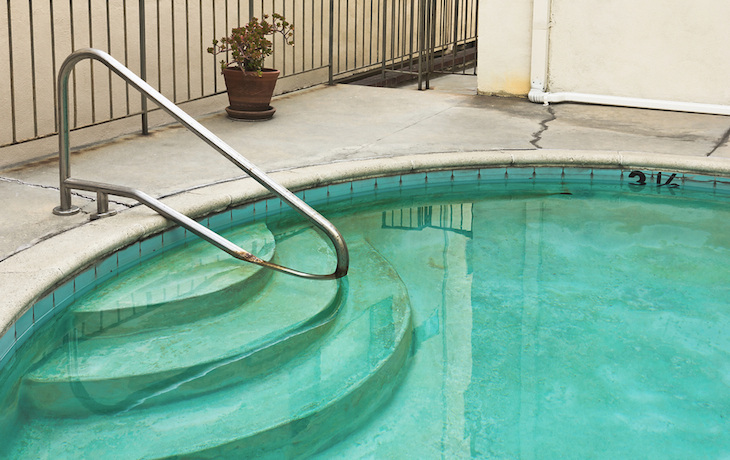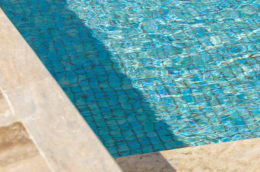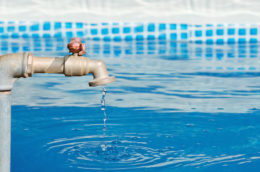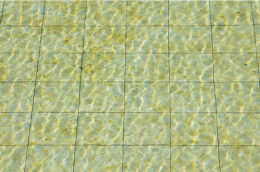Many pool owners, gazing at their pool while thinking about their next move, notice stains…

Why Do Swimming Pools Get Stains?
When I come home from work and see a 3 foot diameter oil stain on my driveway, I immediately know that my son just changed the oil in his truck. No matter how many drain pans or drop cloths that I buy, he still manages to spill a quart of old oil onto the concrete. Unfortunately, swimming pool stains aren’t so self-explanatory. There are many types of stains and the question I get asked is “why?”.
Is Your Pool Water Satisfied?
Let’s tackle the most common stains for pools: metals and scale.
This may be a stretch but try to imagine that your pool water is a beloved family pet. Just like when your cute little puppy, Thor, gets hungry he’s going to find something to eat. It may be dog food or it may be your $300 Italian golf shoes but he is going to eat. Likewise, if you over-feed the little guy with leftover chili, he’s going to leave land mines on your snow-white Berber living room carpet while you’re attending services at Our Lady of the 19th Hole. Well, water has similar characteristics. It has an appetite. It eats and it poops. Water needs a certain amount of mineral content to remain neutral. We refer to this as the “saturation point”.
I know, you’re thinking water is wet, it’s always saturated. Well we’re thinking a different way now. The saturation point is the water condition that satisfies the water’s needs without causing it to “unload” those minerals, etc. Think of it as being balanced…not too hungry, not too full. To be satisfied there are 4 factors that need to be in balance with each other: pH, Alkalinity, Hardness and temperature.
If water is under-saturated, it is known to be aggressive and will eat or etch away at surfaces like pool plaster or metal parts. If water is over-saturated it will poop or deposit metals and minerals onto the surfaces.
Water that is over-saturated with sugar, for instance, makes rock candy as it deposits the excess sugar onto the string in crystals. Does anybody remember making rock candy??
I’ll go into more detail on balance and saturation in my next post, but for now…
Doesn’t My Pool Stay Balanced?
In that ever-elusive “Perfect World”, you know, the one where your kids do all of their chores and Murphy’s Law was repealed, your pool water will stay satisfied and you’ll never have a problem. Now, here in the real world we all know that water does not always stay balanced. Many things affect the pH, Alkalinity, Hardness and temperature of the water. For instance, a lot of pool owners don’t realize that the type of sanitizer that they use will have a great impact on water balance. Granular Calcium Hypochlorite, commonly called powdered shock, has a natural pH of around 12 while stabilized chlorine tablets have a pH of around 3 or 4. As you can imagine, when we try to maintain a pH of 7.4 in our pool and add a dose of shock at a pH of 12, the pH and likely the alkalinity will spike and the water becomes over-saturated causing metals and minerals to come out of “solution” and cause stains. Of course, the opposite happens with chlorine tabs. The moral here is that it’s important to be in tune with your pool and its needs. Heavy bather loads, weak bladders, heavy rains, tree leaves and a host of other causes will result in fluctuations in water balance.
When these fluctuations occur we either have a corrosive condition or a staining condition. Since staining is more visible, we tend to be more aware of it. Corrosive or “Aggressive” water can actually be more damaging to your surface and equipment but often the damage is done before the problem is discovered.
Just like with nearly everything on earth, balance is key. Yin and Yang, work and play, sweet and sour, all have that middle ground where everything’s good and your pool water is no different. So…take a few minutes each week and get in tune with your pool by testing the factors in your water and keeping them balanced.




I totally agree when you said that the needs of the pool should be checked from time to time to keep damage from happening. I think that is the reason why our pool needs repair already.